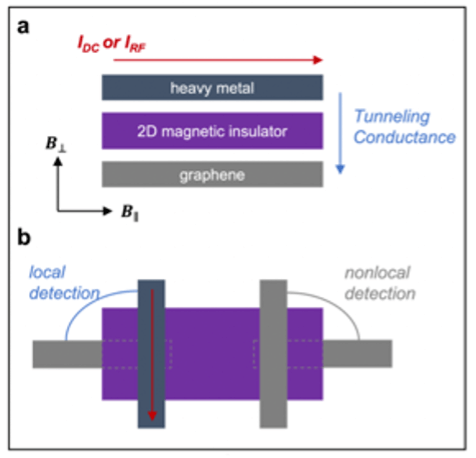Summary
Developing hybrid quantum systems is essential to harnessing the complementary advantages of different quantum technology platforms. This necessitates the successful transfer of quantum information between platforms, which can be achieved, e.g., by harnessing magnons, or spin wave excitations, in magnetic materials. Decoherence due to uncontrolled coupling of qubits to the environment remains a fundamental challenge in many current platforms but can be potentially overcome by harnessing magnon Bose-Einstein condensates (BECs) and non-Abelian Majorana fermion excitations that arise from a Kitaev quantum spin liquid (QSL). The goals of this project are (1) to generate and detect coherent magnons in 2D magnets for quantum magnonics; and (2) to induce collective quantum states in 2D magnets (magnon BECs and Kitaev QSLs), which can provide an alternative route to defeat quantum decoherence. 2D magnetic insulators interfaced with topological semimetals will be fabricated to generate and detect coherent magnons, magnon BECs and QSLs. Radio-frequency (RF) current driven through the metallic layers will yield a spin and/or anomalous Hall current that will exert torques and excite spin waves in the magnetic layers. The excited magnons will be detected using electron tunnelling. Success in these experiments will allow for alternative qubit implementations, which can significantly benefit the quantum technology sector, including mediating quantum information transfer in hybrid quantum systems and potentially being used as a platform for noise-tolerant quantum computing.
Related Content

Composite Superconductors for Improved Quantum Coherence
Summary Conventional superconductors have trouble performing well in magnetic fields required for electron spin resonance (ESR) – based quantum information processing applications. We can, however, use proximity engineering to select desired properties from different materials and combine them for improved superconducting performance in magnetic fields — an improvement that would have strong implications for […]
December 12, 2018

Molecular Scale Magnetic Resonance Imaging
Through its phenomenal ability to image soft tissues, magnetic resonance imaging (MRI) has revolutionized both clinical medicine and research biomedicine.
September 9, 2016
Implementing High-fidelity Quantum Gates in Multi-level Trapped Ions
Summary The scalability of quantum processors is limited by current error rates for single-qubit gates. By encoding more than a single bit of information within a single ion, multi-level “qudits” offer a promising method of increasing the information density within a quantum processor, and therefore minimizing the number of gates and associated error rates. […]
July 30, 2018

Tuning Spin-Exchange Interactions in Low-Dimensional Metal Halide Perovskites: A New Class of Semiconductor Quantum Materials
Summary Leakage current in electronic components is one of the limiting factors for the performance of conventional computers which use charges and currents as physical information carriers. Spintronics offers an alternative by using electron spin for information transfer, processing and storage, enabling the design of non-volatile computer memory and more energy-efficient electronic devices. In this […]
October 1, 2019


